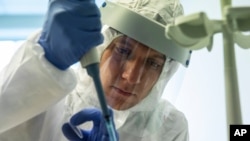The United States says it will not participate in a global initiative to develop, manufacture and equally distribute a vaccine for COVID-19 because the World Health Organization is taking a leading role in the effort.
More than 170 countries are in talks to participate in the COVID-19 Vaccines Global Access Facility, called COVAX, a joint project undertaken by WHO, the Coalition for Epidemic Preparedness Innovations, and Gavi, the Vaccine Alliance.
Gavi was founded by the Bill and Melinda Gates Foundation to vaccinate children in the world's poorest countries.
White House spokesman Judd Deere issued a statement saying the United States "will continue to engage our international partners to ensure we defeat this virus, but we will not be constrained by multilateral organizations influenced by the corrupt World Health Organization and China."
President Donald Trump announced in July that he was withdrawing the United States from WHO, claiming the agency mishandled the outbreak and showed deference to China, where the virus was first detected late last year.
The State Department said Wednesday that as part of the withdrawal, the administration would redirect $62 million of its 2020 WHO dues to meet its obligations under the United Nations' regular budget.
Under withdrawal terms, Washington must provide a one-year notice to WHO and fully meet the payment of its assessed financial obligations. Washington had already paid $58 million of this year's $120 million contribution at the time of the president's decision to withdraw. The U.S. says it will in the future redirect money that would have gone to WHO to "other more credible partners."
On the vaccine effort, Suerie Moon, co-director of the Global Health Center at the Graduate Institute of International and Development Studies in Geneva, told The Washington Post that when the United States decides not "to participate in any sort of multilateral effort to secure vaccines, it's a real blow."
The Trump administration has launched its own COVID-19 vaccine initiative, Operation Warp Speed, that aims to deliver 300 million doses of an approved vaccine by January. The initiative has distributed billions of dollars to a handful of pharmaceutical companies to develop, manufacture and test a potential vaccine.
"This president will spare no expense to ensure that any new vaccine maintains our own FDA's gold standard for safety and efficacy, is thoroughly tested, and saves lives," Deere said in his statement, referring to the U.S. Food and Drug Administration.
The Trump administration's initiative is one of many around the world aiming to quickly introduce a COVID-19 vaccine, with a handful currently in late-stage human trials. But recent remarks by FDA Commissioner Stephen Hahn that the agency would consider authorizing an emergency use of a vaccine before the completion of late-stage human trials raised concerns Monday among WHO officials.
Dr. Soumya Swaminathan, WHO's chief scientist, said issuing such an authorization "has to be done with a great deal of seriousness and reflection. It's not something that you do very lightly."
Blood plasma treatment
In a related development, a panel of U.S. government health experts said there is no evidence to date that convalescent blood plasma is an effective treatment for coronavirus patients to help them build immunity.
Convalescent blood plasma comes from patients who have recovered from COVID-19 and is rich in antibodies. The FDA approved an emergency authorization of the use of convalescent blood plasma Aug. 23, a decision Trump described as "truly historic."
But a panel of more than three dozen experts for the National Institutes of Health issued a statement Tuesday that there is "insufficient data to recommend either for or against the use" of convalescent blood plasma, and said doctors should not rely on it as a standard of care until more studies have been conducted.
A day after the emergency authorization was announced, Hahn apologized for apparently overstating the benefits of using convalescent blood plasma.
Hahn reaffirmed claims made by Trump and Health and Human Services Secretary Alex Azar of a 35% decrease in mortality among those younger than 80 years of age who were not on a respirator, a month after receiving the treatment early in the course of their disease.
But critics said the administration's claim was a gross exaggeration of preliminary findings of a study conducted by the Mayo Clinic, noting that the study lacked a comparison group of untreated COVID-19 patients.
Hahn conceded this fact in a tweet apologizing for his remarks, explaining that he should have said that the data shows "a relative risk reduction, not an absolute risk reduction."
Richard Green and Margaret Besheer contributed to this report.








